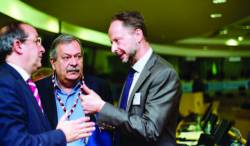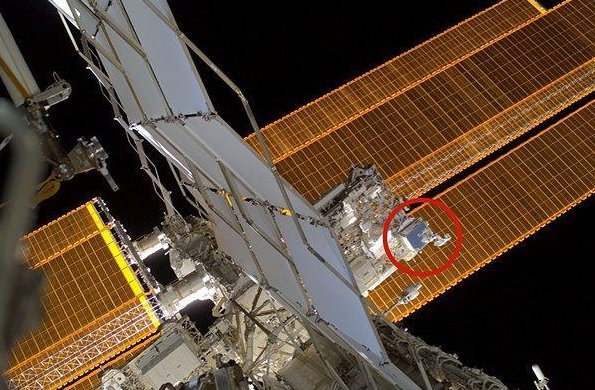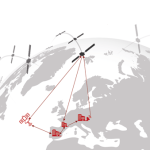 At the European Economic and Social Committee’s Space & Society Conference, from left, Daniel Calleja Crespo, director general of European Commission’s DG Growth; EESC Space and Society Project Coordinator Edgardo Maria Iozia, and Giulio Bartolani di Montauto, European Space Agency’s Brussels office.
At the European Economic and Social Committee’s Space & Society Conference, from left, Daniel Calleja Crespo, director general of European Commission’s DG Growth; EESC Space and Society Project Coordinator Edgardo Maria Iozia, and Giulio Bartolani di Montauto, European Space Agency’s Brussels office.Reporting from Brussels last year, we explained that the then–brand new EU GNSS Regulation had effectively put to bed years of wrangling over who does what in Europe’s GNSS programs. But the issue reared its head again in Brussels recently, in a highly charged discussion hosted by the European Economic and Social Committee (EESC).
Reporting from Brussels last year, we explained that the then–brand new EU GNSS Regulation had effectively put to bed years of wrangling over who does what in Europe’s GNSS programs. But the issue reared its head again in Brussels recently, in a highly charged discussion hosted by the European Economic and Social Committee (EESC).
The EU GNSS Regulation, announced officially at the start of 2014, put the European Space Agency (ESA) squarely in charge of technical development and deployment of the EU’s satellite navigation systems, EGNOS and Galileo, with the European Commission (EC) retaining overall responsibility for the programs, and the Commission’s subsidiary European GNSS Agency (GSA) covering operational management.
Of course there never was much in the way of specifics in the Regulation itself. It paints a rather tranquil and unchallenging picture with fairly broad strokes, a sort of Monet (or is it Manet?) of the legislative art.
The real nuts and bolts of day-to-day cooperation between bodies like ESA and the European Commission are generally only established in binding detail in subsequently negotiated “delegation agreements” between the actual parties. Here, in theory, the real tasks are handed over to those with real feet on the real ground. Such agreements are often only achieved after rounds of tough discussion, and a genuine sense of relief appears when a new agreement is signed and sealed and the real work can get started in earnest.
Daniel Calleja Crespo, Director General of DG Growth, the EC’s man in charge of Space, said it all in his brief presentation to the EESC’s Space & Society Conference in Brussels on June 29, when he was asked to address the subject of space governance: “I have my [delegation] agreement, I have my budget, we move forward and get to work.”
But we’re getting ahead of ourselves.
Just what is the status and role of the EESC in such matters? An EU advisory body whose representatives are appointed by national governments, the EESC comprises representatives of workers’ and employers’ organizations and other interest groups. It issues opinions on EU issues to the EC, the Council of the EU, and the European Parliament, thus — in the EU’s description of it — “acting as a bridge between the EU’s decision-making institutions and EU citizens.”
Terms of Engagement
First up in EESC discussion was Giulio Bartolani di Montauto from ESA’s Brussels office, in charge of ESA relations with the European Union (EU), speaking to the event’s hopeful theme, “Towards a European Space Community,” which itself was the culmination of a six-event series conducted under the more revealing tagline, “Bridging the Missing Links.”
On the question of a comprehensive EU space industrial policy, Bartolani said “confusion” existed concerning the roles of the EC and ESA. “No one seems to know really who is to do what,” he said. “We need separate entities that know what they are doing.”
Bartolani noted that there are currently a number of EC-ESA delegation agreements now in force, but that multiple documents may actually make the situation more, rather than less, confusing.
“We need to simplify,” he insisted. And a clarification of ESA roles, he said, would represent a great aid to the European space industry, to help it to stay competitive.
The current situation in terms of program and project management is “fragile”, Bartolani added, and a reorganization of the role of the public sector would mean greater stability for industry over the long term.
The EC’s Calleja was to the point: “You can’t modify a working agreement just like that,” snapping his fingers. “The name of the game is growth and jobs. We need to stop talking and start working, to deliver concrete benefits to citizens.”
Here we inform the reader that Calleja’s remarks were not in direct response to those of Bartolani. In fact Calleja had not been in the room to hear Bartolani’s earlier comments, having only arrived at the venue some minutes later.
What Calleja was responding to was a remark about governance from another participant at the event — EESC Space and Society Project Coordinator Edgardo Maria Iozia sitting next to Calleja, who said, “Governance is one of the main arguments, if not to say ‘problems,’ today.”
Iozia had wanted to know if there was not a better arrangement, a more advanced solution for the “triangle” — ESA, GSA, and the EC — “to boost activity”. So, Calleja’s remarks were not a direct rebuttal of Bartolani’s.
It was difficult, however, not to hear a direct ESA-EC confrontation taking shape when Bartolani responded, a bit later, as he was asked to comment once more on space governance, and in particular on the commission’s position.
In a clearly disparaging manner, Bartolani remarked that the EC was no longer in the room, that the commission had no time for discussion, because they were too busy. The EC is too busy to discuss governance, he repeated.
Indeed, Calleja was once again not in the room to hear Bartolani’s remarks. Unfortunately, or fortunately, he had needed to quickly leave the conference after his own brief intervention.
“The Commission is not here,” repeated the session moderator Joost van Iersel in his own turn, in a descending and disappointed tenor.
In fact, the commission was still in the room, in the person of audience member and EC Policy Officer Agnieszka Lukaszczyk, who bravely stepped up and defended the commission’s commitment to cooperation and indirectly her boss’ comments about the EC workload.
But the point had already been made — ESA believes the governance arrangements should be revisited, while the European Commission wants to move on.
Eight Is Too Much
We asked Bartolani during a coffee break to elaborate on his comments about European space governance and he had this to say: “We have eight delegation or similar agreements currently running with the EC, and that is just too much.
“The content of each agreement is different, and we have different roles to play, depending on the agreement. We have to change our hats each time. For some projects we act as prime contractor, for others it’s something different. It shouldn’t be that way. Each partner should do what he does best.”
[Flashback to 2013 – writing about a delay in the Galileo satellite launch schedule, we reported that one informed but unnamed officer had complained that, “ESA is not able to carry out the duties of an industrial prime.” That officer went on to describe ESA’s management style as, “typical of an agency but not at all of an industrial prime.”]
Perhaps most importantly, Bartolani added, “It is confusing to our industrial partners to see the role of the agencies changing depending on which project we are discussing.”
Bartolani also showed us a list of the agreements in question. They are:
- Galileo Deployment Delegation Agreement, till 2021
- Galileo FOC Delegation Agreement till, 31 December 2015
- EGNOS exploitation Delegation Agreement, till 2016
- Two ESA-GSA Working Arrangements, one concerning EGNOS and one concerning Galileo
- EU-ESA Grant Agreement on IOV, till 2016
- Copernicus Delegation Agreement, till 2021
- Future Agreement on Horizon 2020
He emphasized that “each of these agreements has a different role for ESA. Not all of them are ‘delegation’ agreements but each negotiation is time-consuming and difficult. Vis-à-vis industry, operators and users, this is very confusing and needs an overall clarification.”
“In my view, it is up to member states to analyze the situation, give guidelines on how to improve the present situation, and finally decide,” Bartolani added.
Okay, perhaps more like Jackson Pollock than Monet.
Back at the EESC conference, in response to a question from the audience, Bartolani insisted, “No, ESA is not destabilized. We have our own budget, which has been growing steadily for 30 years. We have our own programs, projects, and membership.” But, he added, “ESA is a research and development agency. We need simplification.”
A member of European Parliament and former Galileo Rapporteur Marian-Jean Marinescu didn’t seem to know what all the fuss was about. Like Calleja, he is content with the existing arrangements and urges perseverance, although his comments seemed to suggest he was limiting his thinking to only the GNSS section of EC-ESA relations.
“The Galileo regulation is very clear,” Marinescu said. “The tasks of GSA and ESA are clear and specific. Someone has to be the boss.
“Governance is there now. We have spoken a lot about it with the GSA and ESA. Follow the regulation,” Marinescu admonished.
Less Is More
If, as Bartolani’s says, eight is too much, then logically there should be a smaller number. Presumably, that means one or more of the existing agreements should be eliminated or some number of them combined. Or it could mean that the agreements could remain separate but all should be harmonized. Any way you look at it, it means re-negotiation.
Bartolani’s recommendation that member states should be the one’s to analyze the situation and come up with a solution seems vague to us. What would be the form or mechanism of this kind of analysis? Who is going to make it happen?
And what has all this to do with GNSS?
The EU Galileo community appears to feel safe in the arms of its own tidy accord with ESA, but a mounting storm that might see ESA moving to consolidate/harmonize/simplify some number of its messy agreements with the Commission could end up threatening that tranquility.
The GSA’s Gian Gherardo Calini asked Bartolani directly if he was talking about GNSS cooperation or space cooperation in general, and he showed visible relief when Bartolani said it was about space cooperation in general. But surely “space in general” includes GNSS.
By the way, whoever may be stepping to the table for a new round of wrangling and rancor, it won’t be someone we know. The doughty Jean-Jacques Dordain has been replaced by Johann-Dietrich Wörner as general director of ESA, while Daniel Calleja Crespo is soon to leave his post as head of DG Growth, to be replaced by Lowri Evans, who has been director-general of the commission’s DG Maritime Affairs and Fisheries since 2010 (and who, thankfully, only has two names).
Who knows? These fresh faces may want nothing more than to shake things up a bit, to engage in a little energetic arguing, have some fun with it, as they take the reins of their new posts. What better way to get to know each other? And, after all, that’s how progress is made.
We now recall the words of the then-new commissioner for Internal Market, Industry, Entrepreneurship and SMEs (small and medium-sized enterprises), including space affairs, the impressive Elżbieta Bieńkowska, who last January said, “We need better and more coherent governance for space. ESA and the EU need a better common view. Governance must be changed.”
At that time, we thought the Commissioner’s words were surprising, if not entirely off the page. Little did we know.





